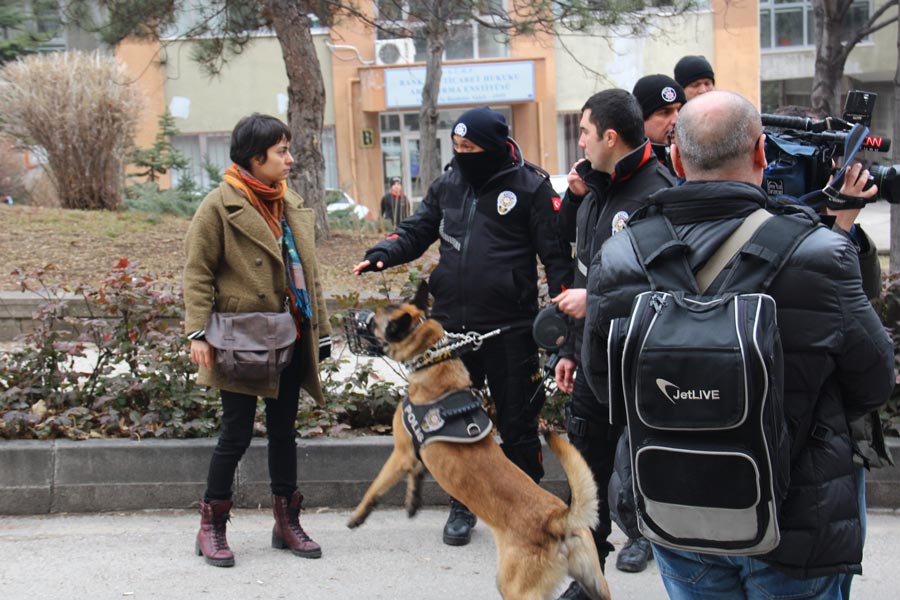The government dismissals of academics, prosecutions against university staff members and arrests of professors create a toxic climate of fear on campuses across Turkey, Washington-based Human Rights Watch (HRW) documented in a recent report.
HRW noted that the government’s meddling in academic affairs and police intervention to break up student groups consequentially lead to self-censorship and choking off academic freedom.
“The Turkish government’s crackdown is targeting academics and damaging its universities,” HRW Europe and Central Asia director said in a statement.
“Academics and students should be free to express, teach, and research controversial or critical ideas without risking dismissal or imprisonment.”
A failing grade? Turkey government’s crackdown at universities leads to self-censorship and a climate of fear, @hrw research shows. pic.twitter.com/ok3UWiaemc
— Zama Neff (@ZamaHRW) May 14, 2018
According to HRW report, the Turkish authorities summarily dismissed thousands of academics without any due process, mostly on dubious charges of terrorism or links to the abortive coup attempt. Hundreds of academics also face terrorism accusations.
Those who were sacked from university posts are unable to work either in public or private sector due to political pressure.
Over the past two years, several international reports brought the cataclysmic effect of the purge on people’s daily social and economic life into the public scrutiny. Since there is no effective path for legal remedy at domestic realm, the suffering of the sacked public workers and academics remains an enduring problem in the social domain.
The HRW interviewed 15 academics, seven of whom were dismissed by the emergency decrees issued in the aftermath of the coup, and talked to four students from different universities, and four lawyers.
Out of those academics, only one of them was able to flee the country and began to work at a university abroad. Thirteen of them are under criminal probe due to either terrorism or coup-related charges.
More than 5,800 academics have lost their jobs in the post-coup crackdown, HRW noted. Out of them, at least 378 academics were sacked over signing a peace petition calling for the end of security operations in Kurdish southeast.
Additionally, 38 more academics from public universities and 48 from private universities were dismissed by their university administrations on the same ground.
HRW said it examined eight cases of academics fired from their posts. “In the case of those fired under emergency decrees, it was impossible to determine the reasons for their dismissal ad the decrees include no evidence of alleged wrongdoing or individualized justifications. The decrees only refer to generalized alleged links to “terrorist organizations,” it said in its report.
There is little the dismissed workers can do to redress their situation at courts. After facing international and domestic criticism, the government established a seven-member commission to review the cases of dismissed public servants and academics.
As of last month, more than 108,000 have submitted applications to the commission. The commission only reviewed 12,000 cases and overturned decisions about 312 people. The process seems to be proceeding very slowly.
What made the sacked workers’ lives worse is the fact that majority of them are unable to find jobs in private sector. Of those who somehow manage to find a one, they mostly work hard labor sectors with a low payment and no insurance. The purged academics also saw their passports revoked. The travel ban limits their movement and their potential intention to leave the country to work somewhere else.
According to HRW, even family members of the dismissed government employees have been fired from private sector jobs.
In chronicling the suffocating atmosphere of fear on campus during the emergency rule, professors and students told HRW that “Turkish universities are no longer place where critical debates, creative thinking, and the discussion of controversial ideas were possible.”
A senior academic said: “Fear and self-censorship are like smoke. It seeps everywhere, and it gets thicker every day. We cannot breathe anymore.”
The government ground its dismissal of more than 150,000 public workers, including academics, on alleged ties to Gulen Movement, which it describes as a terrorist group.
HRW said it has “seen no evidence in relation to individual academics that would support the conclusion that they were involved in violence, plotting a coup, or other conduct that would justify their dismissal.”




Comments are closed.